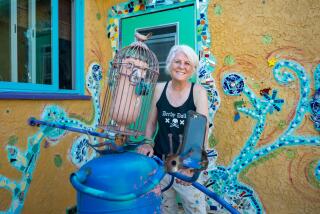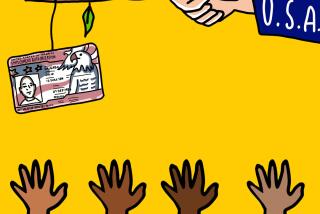ACLU Files Against Judge Who Killed Donkey Cart Art
A federal judge who ordered an artwork removed from the U.S. Courthouse plaza has been named as a defendant in a lawsuit filed in his own court.
The suit, filed Friday by the American Civil Liberties Union on behalf of artist David Avalos and Sushi performance and art gallery, names Chief U.S. District Court Judge Gordon Thompson as a defendant, as well as the U.S. General Services Administration and GSA field director Paul Hamilton.
After filing the suit, the ACLU, upon hearing that it was likely that all the district judges would excuse themselves from hearing the case, sought an immediate hearing in the U.S. 9th Circuit Court of Appeals in San Francisco.
In related matters, the San Diego City Council’s Public Arts Advisory Board unanimously passed motions condemning censorship of artworks and requesting that the City Council send a letter to Thompson asking the judge to reconsider his action.
The chain of events began Sunday when Avalos installed his “San Diego Donkey Cart” on the courthouse plaza. The full-size artwork portrays a border patrolman apprehending an undocumented Mexican illegal immigrant. The cart, modeled after a Tijuana donkey cart, carries the legend “Raza Si, Migra No,” which translates as “the people yes, immigration officials no.” The Federal Building, which is adjacent to the plaza, contains offices of the Immigration and Naturalization Service.
On Monday afternoon, Thompson ordered GSA’s Hamilton to remove the cart for security reasons. Avalos was then informed in a letter signed by Hamilton that his permit for the exhibit had been revoked, and the letter demanded that the cart be removed.
The ACLU suit also seeks a temporary restraining order, which would put the artwork immediately back on view.
It alleges that Thompson unlawfully directed Hamilton to remove the cart for security purposes. “The judicial powers of this court extend only to cases or controversies, neither of which was brought before the court, and therefore the purported exercise of judicial power was void,” the complaint states. Hamilton felt “compelled by the judicial power” of the court and had the cart removed, the complaint alleges.
“We’re alleging that the cancellation of the permit was unlawful,” Greg Marshall, an ACLU attorney, said, “and are requesting the restraining order because the idea is to get relief immediately, pending a full hearing.”
“There’s no reason to put the piece there three months from now, and Mr. Avalos has his own plans for the piece,” Marshall said. “Additionally, (the removal) is a gross violation of his rights. It’s continuing every minute and should be brought to an end at the earliest possible moment.”
A ‘Classic Case’
Linda Hills, director of the San Diego Chapter of the ACLU, called the removal of Avalos’ artwork “a classic First Amendment case. We think this is censorship based on political content and we’re concerned about the due process aspect of it. It was ordered removed in a peremptory way. There was no process followed to have it removed.”
The cart is one of four works in the “Streetworks” show sponsored by Sushi gallery but was the only one placed at the courthouse, 940 Front St. When Avalos refused to remove the cart, GSA officials dismantled it and put it in the basement of the Federal Building.
At Thursday’s meeting of the Public Arts Advisory Board, Avalos spoke about the removal of his artwork. Eight of the nine board members were present and unanimously passed the motions requesting Thompson to reconsider his decision and stating that the board is “against censorship of the arts in any form.”
Ed Pieters, who heads the advisory board, said that, “Speaking as an artist, if it is proven to be a case a censorship, I think Judge Thompson has posed a serious threat to the creative freedom of artists and writers working in the United States. This is no small matter.”
Pieters acknowledged that the donkey cart was controversial, “but so was Martin Luther King. I’m upset by this whole matter myself. It’s not in the tradition of this country to do this. It’s like a Berlin Wall down there.”
Attracted Attention
Artist Wick Alexander, who works at the federal Metropolitan Correctional Center, was “really surprised to see it in front of the courthouse. When I passed by (the donkey cart) Monday, it was lunch hour and quite a crowd was looking at it,” Alexander said. “They were scratching their heads and wondering what was going on. But they seemed interested and not outraged.”
District Judge Earl B. Gilliam excused himself Friday from hearing the ACLU suit because of knowledge of the incident. The donkey cart was discussed at a meeting of all 10 judges of the District Court. It was at this meeting, Thompson has said, that concerns were voiced about the cart posing a security risk. When Gilliam’s court clerk indicated that it was likely that all of the District Court judges would excuse themselves, the ACLU sought the hearing with the Court of Appeals on the temporary restraining order. The appeal court had not responded to the request by late Friday.
On Thursday, Thompson said: “These people are trying to read something into this that wasn’t there.” He said that the nature of a courthouse creates a “volatile” atmosphere.
“We have some pretty volatile people just walking the hall,” Thompson said. The donkey cart, he feared, “might give them a potential vehicle” to damage people, the courthouse or the artwork.
More to Read
Sign up for Essential California
The most important California stories and recommendations in your inbox every morning.
You may occasionally receive promotional content from the Los Angeles Times.










